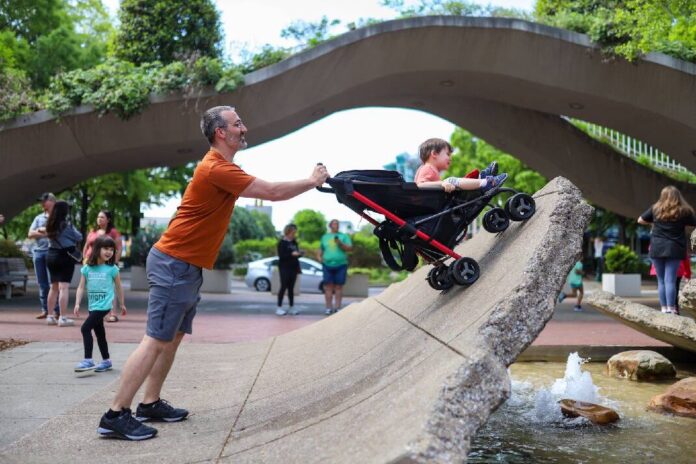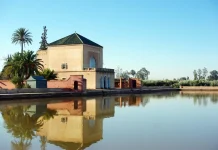In 2019, Tennessee’s tourism economy was roaring with record-breaking numbers of visitors coming to the Volunteer State that year and spending more than $22 billion.
Then came the Covid-19 pandemic. In March 2020, the state’s tourism economy virtually shut down overnight, cutting many of the 150,000 tourism-related jobs across the Volunteer State at restaurants, retail shops, hotels and attractions.
Although most businesses reopened by late spring in 2020 and travel rebounded some during the rest of the year, 2020 visitor spending still plunged by more than 30% in Hamilton County in 2020, reversing decades of growth in visitor spending in the Scenic City and cutting nearly 3,500 jobs in Chattanooga.
But after more than two years of lock-downs, travel restrictions and working at home for many people, families are eager to travel again this year.
“There is a tremendous amount of pent-up demand and people are eager to get out and see places like Chattanooga,” says Barry White, president of the Chattanooga Tourism Company.
The $1.5 billion-a-year tourism industry in Hamilton County has rebounded and is even generating more revenue locally than it did in the previous record year in 2019.
Although hotel occupancy is relatively flat after rebounding in 2021, there are about 3% more hotel rooms in Hamilton County now compared with 2019 and more are on the drawing board. With more inventory and higher hotel room rates, total hotel revenues in the first quarter of 2022 jumped by 36% over the same period a year ago and were 7% above the pre-pandemic levels in 2019, according to hotel room tax collections compiled by the Hamilton County trustee’s office.
Average hotel room rates also rose above $100 a night in Chattanooga during the past year as increased demand, newer high-end properties and inflationary pressures all pushed up average rates.
Photo Gallery
Tourism turnaround: Travelers eager to vacation this summer boost hotel revenues above pre-pandemic levels
View 6 Photos
Chattanooga’s appeal
Even with higher rates, Chattanooga remains a more affordable market than many major cities and is within a day’s drive of over half the U.S. population.
“We had a very strong spring season and we expect a very strong summer,” says Keith Sanford, president of the Tennessee Aquarium, Chattanooga’s biggest tourism draw which is celebrating its 30th anniversary this year. “Chattanooga is a great drive-to tourist destination and I think people are eager to get out and travel again.”
Aquarium officials project slightly more visitors this year than in the last pre-pandemic year in 2019 when there were about 780,000 visitors. Last year, the aquarium recorded 668,709 visitors.
By the numbers
* $1.5 billion – Annual economic value of the tourism industry in Hamilton County.
* 43,000 – Number of daily visitors to Hamilton County.
* $4.1 million – Daily spending by visitors on dining, experiences, lodging, and more.
* $868 – The tax savings for the typical Hamilton County household due to extra taxes paid by visitors.
Source: Chattanooga Tourism Company
Vacationers are eager to travel again, as evidenced by record bookings this spring on Alaska Airlines, American and Delta airlines. United says it expects record revenue in the second quarter.
“Demand is as strong as we’ve ever seen it,” says Robert Isom, American’s chief executive.
Ed Bastian, CEO of Delta Airlines, told industry analysts this spring he expects a strong rebound in travel this summer.
“As COVID shifts from a pandemic to a manageable seasonal virus, there are clear signs of pent-up demand for travel and experiences, as consumers’ spending shifts from goods to services and experiences, travel restrictions lift and business travelers continue to return to the skies,” he said.
A new travel frontier
The World Travel & Tourism Council, a travel industry research organization, foresees 6.2% growth in travel above pre-pandemic levels this year.
But business travel has yet to return to pre-pandemic levels and after two years of managing business remotely and using teleconferencing, some business trips may not ever return to the levels of the past. A survey by the Institute of Travel Management (ITM) of 100 heads of travel this spring found just 28% of respondents expect travel to return to the level of 2019.
Conventions are rebounding, but digital connections are allowing more web-based meetings and events that could limit the size and number of some in-person conferences.
The biggest rebound has been in leisure travel which is Chattanooga’s biggest source of tourism spending. The outdoor and natural appeal of the Scenic City known for its mountains, rivers, biking, hang gliding, rafting and caving activities, also give Chattanooga an advantage over urban attractions as people navigate a world of social distancing again if new Covid variants break out.
Travelers are facing higher fuel costs, which have nearly doubled from the pandemic lows of just a couple of years ago, especially after Russia invaded Ukraine earlier this year and one of the world’s biggest oil producers has been largely cut off from the West.
First quarter comparisons
Hotel Occupancy
* Q1 2021: 52.9%
* Q2 2022: 57.2%
* Reason: more visitors
Hotel Revenue
* 2021: $40.5 million
* 2022: $55.0 million
* Change: +36%
* Reason: average daily rate increased and occupancy increased
But even with gas prices nearly 50% above year-ago rates, Chattanooga is still faring much better than it was in luring vacationers and business travelers to town.
“We’re within a day’s driver of half the U.S. population and our biggest markets are 2-hour drives away in cities like Atlanta, Nashville and Knoxville,” White says. “For those travelers, the higher price of gas will add a few dollars on their trips here, but it isn’t going to deter people eager to get out again from making the trip. We remain well located, whereas some markets out west could see some impact from higher gas prices.”
To be sure, a slowing economy, rising inflation and higher gas prices may restrict some travel. But Tennessee’s tourism commissioner, Mark Ezell, said he is expecting a return to normalcy this year and hopes to reset travel and tourism conversations to where they were following the boom years of 2016-19 when Ezell said tourism spending grew by 50% across the state.
“During that period, Tennessee was the fastest-growing state in America for international visitors,” he says. “They want to visit Nashville, they want to visit Memphis, and we have provided more education about the [Great Smoky Mountains National Park] and East Tennessee, there’s more interest about the destinations there. The leisure and hospitality world in Tennessee has been so resilient.”
White says those visitors are helping local residents by ensuring more activities, events and eating places can afford to operate here. And the money spent by visitors helps fund local schools and other programs.
“Due to sales taxes paid by visitors, each Hamilton County household saves $868 in property taxes annually,” White says. “Visitors spend money in Hamilton County and support the same businesses and experiences our residents enjoy. Without them, our quality of life would diminish.”
Escape the ordinary and discover the extraordinary! From bustling cities to serene landscapes, every journey begins with a single step—let us guide yours. Enjoy curated itineraries, hidden gems, and hassle-free bookings designed for explorers at heart. Whether it's a weekend getaway or a globe-trotting adventure, your Next unforgettable experience is just a click away.










